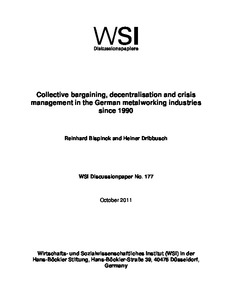Collective bargaining, decentralisation and crisis management in the German metalworking industries since 1990
"Collective bargaining in the German metal and electrical engineering (M+E) industries has undergone a phase of considerable development since the 1990s. The profound changes which underwent collective bargaining in M+E over the last two decades have to be regarded against the background of a n...
| Main Authors: | , |
|---|---|
| Institution: | ETUI-European Trade Union Institute |
| Format: | TEXT |
| Language: | English |
| Published: |
Düsseldorf
2011
HBS |
| Subjects: | |
| Online Access: | https://www.labourline.org/KENTIKA-19135253124919534359-Collective-bargaining,-decentr.htm |
| Summary: | "Collective bargaining in the German metal and electrical engineering (M+E) industries has undergone a phase of considerable development since the 1990s. The profound changes which underwent collective bargaining in M+E over the last two decades have to be regarded against the background of a new global and national political and economic environment which emerged after the end of the Cold War. The M+E sector with at its core the automobile industry underwent successive waves of restructuring which shaped the bargaining agenda. This discussion paper examines these developments, putting a special focus on the changing bargaining agendas at both sectoral and company level and looks in particular at the decentralisation of collective bargaining. The management of the crisis of 2008 - 2010 in metal manufacturing is a further topic.A first version of this paper was presented at a meeting of the European GUSTO research project on 6 September 2011 in Barcelona." |
|---|---|
| Physical Description: | 67 p. Digital |

